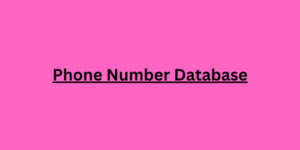But first, what is a CRM?
What does a real estate CRM do? It helps you manage all the Phone Number Database facets of a customer’s buying journey. When your brokerage or team is on the hunt for a real estate CRM software, it’s critical to consider your specific business needs. Which CRM features will help you grow faster, make it easier to stay in touch with clients, and automate tasks to free up valuable time? Here are some considerations when selecting a real estate CRM platform:

Real estate CRM capabilities
Real estate industry CRM considerations to help your real estate business excel with better customer relationship management include:
Sales pipeline management
The sales pipeline is the sequence of steps a prospect goes through until a deal is finalized. As each stage of the pipeline is completed, the prospect moves to the next stage. For example, a sales pipeline for real estate sales leads should include stages and activities such as setting listing appointments, cold calling, generating sales proposals, and property showings. The process of managing these activities and stages in your CRM is called sales pipeline management. Your CRM should make it easy to manage your sales pipeline.
Contact management
A good real estate CRM offers you more productivity with powerful contact management features, such as:
The ability to store detailed information about a contact, including listing, employment history, anniversary dates, etc. This kind of customer repository lets any team member access necessary data quickly.
The ability to store deal-related information such as past emails, and notes
Easy meeting schedulers, a calendar, and ability to set up reminders
Ability to facilitate emails, phone calls, and SMS plus integration with third-party apps for communication and lead sourcing.
Task management
You should be able to organize your workday better by using a CRM. Setting reminders should be easy, and it should sync with your Google Calendar or native calendar so you never miss a deadline.
IDX services
An IDX service allows real estate agents to display a MLS property search bar on their websites. Agents and brokers can use this tool to show more property listings sourced from the MLS on their own websites – offering visitors more options.
The best real estate CRM platforms of 2024
With that said, here are our picks for the best real estate CRM systems in 2024:
1. Agile CRM – best free CRM for real estate
Agile CRM.
Agile CRM is a versatile all-in-one sales, customer service, and CRM platform tailored for businesses of various sizes, including real estate agents. Launched in 2013, Agile CRM offers a comprehensive solution that streamlines contact management, deal tracking, appointment scheduling, and project management. The platform is also user-friendly, inexpensive, and mobile-ready, making it the best free CRM for real estate agents looking to close deals and effectively maintain client relationships.
Features
Lead Management. Agile CRM shines as a real estate CRM and lead generation software, allowing you to handle the entirety of the lead journey effectively. It lets you add leads, label them using tags, monitor their history, and view all of your leads in a Kanban presentation. This guarantees accurate follow-ups and facilitates custom workflow creation.
Telephony Integration. Agile delivers an excellent call center that seamlessly integrates your telephone system and CRM software. It facilitates call recording, usage of preset call scripts, voicemail automation, and analysis of auto-created call logs.
Deals Management. Agile presents an intuitive, interactive pipeline visualization for progress tracking and management of your deals. You can design multiple pipelines as per your requirements, each having its unique deal stages.
360-Degree Contact View. With the 360-degree contact view, you can view all contact-related information in one place, including communication history, social media profiles, interests, engagement points, and notes.
Pricing
Free plan: Charged at $0 for 10 users. Features include: 1000 contacts and companies, custom data fields, lead scoring, unlimited deals, tasks & documents management, appointment scheduling, and email tracking.
Starter plan: Charged at $8.99 per month, this plan includes everything available on the free plan plus 10,000 contacts and companies, two-way email integration, marketing automation, and social monitoring.
Regular plan: Costs $29.99 per month and includes everything in the Starter plan, plus 50,000 contacts and companies, custom deal tracking, 2-way telephony, and mobile marketing.
Enterprise plan: Costs $47.99 per month. Features include everything on the regular plan plus unlimited contacts and companies, post-call automation, call recording, and automated voicemails.
Pros and cons
Pros
Easy to use CRM. Agile CRM offers a simple, visual interface that’s easy to use both on desktop and mobile.
Full-featured sales CRM plus powerful integrations. Agile CRM allows users to monitor sales activity from first touch to closing. It allows seamless transfer of leads to and from a marketing automation platform like GetResponse through tools like Zapier and LeadsBridge.
Inexpensive. Agile’s free plan allows you to have up to ten users, with access to features that are normally paid for in other CRM solutions.
